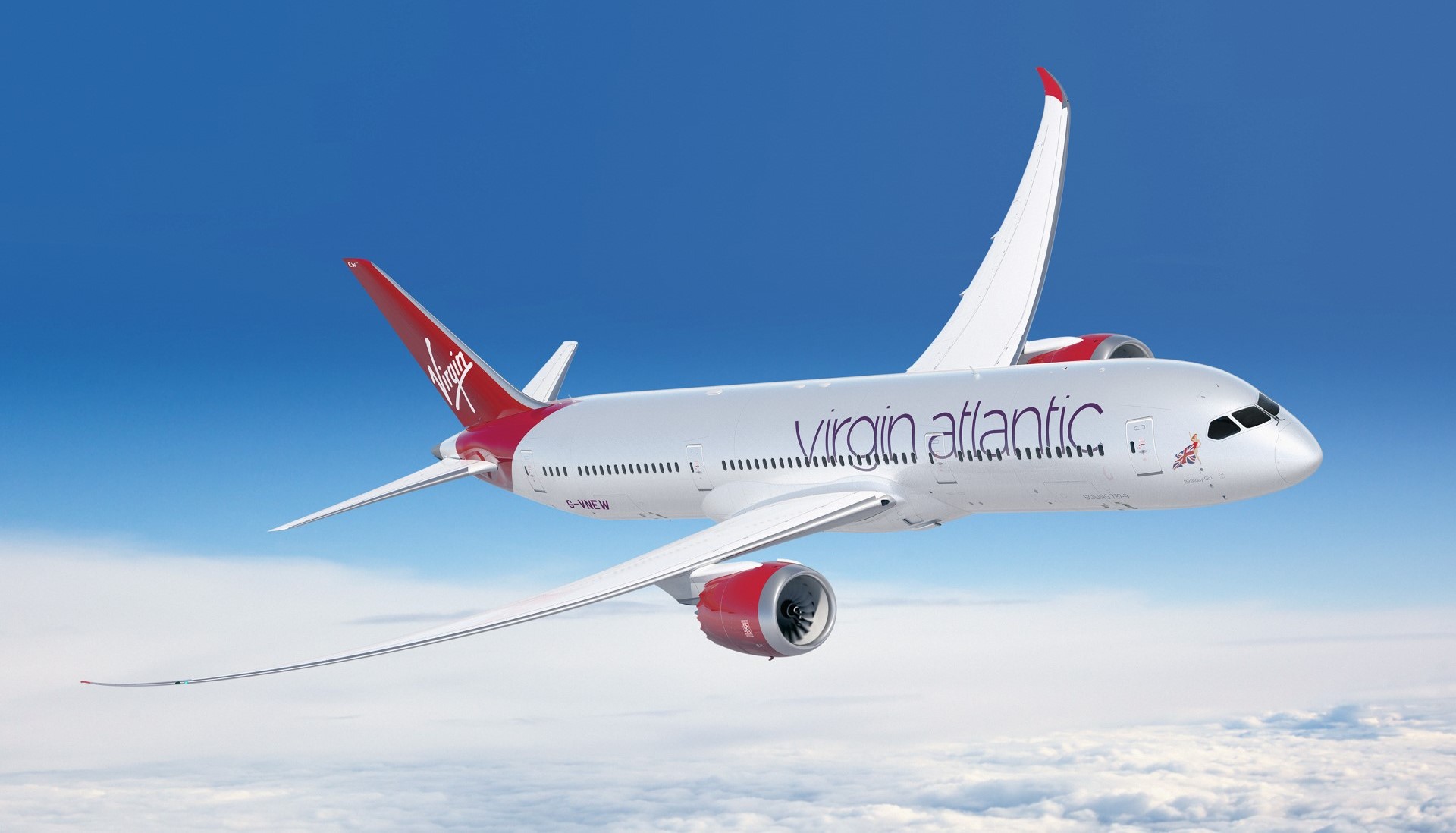Virgin Atlantic’s highly anticipated transatlantic flight running on “100 per cent” sustainable aviation fuel is set to take off today.
The “historic” flight, dubbed Flight100, taking off from London Heathrow this morning and landing later today at New York JFK, has been hailed as an industry first as the aviation community continues to work towards its 2050 net zero carbon emissions target.
Announced earlier this month, the project was made possible after the UK government awarded the airline £1m in funding, which the Department for Transport says will get the UK closer to being “Jet Zero” also by 2050.
Today’s flight “is a major milestone towards making air travel more environmentally friendly,” the government claims. Whilst the Boeing 787 Dreamliner will not carry any passengers, UK transport secretary, Mark Harper, will accompany Virgin Atlantic’s founder, Sir Richard Branson.
Branson said: “The world will always assume something can’t be done, until you do it. The spirit of innovation is getting out there and trying to prove that we can do things better for everyone’s benefit.
“Virgin Atlantic has been challenging the status quo and pushing the aviation industry to never settle and do better since 1984. Fast forward nearly 40 years, that pioneering spirit continues to be Virgin Atlantic’s beating heart as it pushes the boundaries from carbon fibre aircraft and fleet upgrades to sustainable fuels.
“I couldn’t be prouder to be onboard Flight100 today alongside the teams at Virgin Atlantic and our partners, which have been working together to set the flight path for the decarbonisation of long-haul aviation.”
Harper added that “today’s historic flight, powered by 100 per cent sustainable aviation fuel, shows how we can both decarbonise transport and enable passengers to keep flying when and where they want.”
Virgin said the news marks the culmination of a year of radical collaboration to demonstrate the capability of SAF as a safe drop-in replacement for fossil derived jet fuel, compatible with today’s engines, airframes and fuel infrastructure.
It claims that the sustainable fuel delivers CO2 lifecycle emissions savings of up to 70 per cent, whilst performing like the traditional jet fuel it replaces.
As well as proving the capabilities of SAF, Flight100 will assess how its use affects the flight’s non-carbon emissions with the support of consortium partners ICF, Rocky Mountain Institute, Imperial College London and the University of Sheffield.
The research will improve scientific understanding of the effects of SAF on contrails and particulates and help to implement contrail forecasts in the flight planning process. The data and research will be shared with industry.
But environmental campaigners say the potential benefits of SAF are overstated, and that there are multiple problems with the supply of the fuel. Critics have slammed today’s flight as a performative stunt by the UK government and aviation industry, claiming the one-off journey doesn’t necessarily prove SAF can be rolled-out across the commercial aviation sector.
Alethea Warrington, senior campaigner at the climate charity Possible, said: “Unfortunately, running a plane on alternative fuels is less of a breakthrough and more of a gimmick. Virgin is just trying to distract us from the urgent need to cut back on flying to protect the climate.
“We already know that planes can use different fuels – but the problem is that they can’t meet the aviation industry’s gigantic demand for kerosene.
“If airlines try to roll this out at scale, it would result in massive environmental harms from the huge scale of land, crops or energy that would be needed, while also being extremely expensive.
“If airlines like Virgin really care about the impact their flights have on the climate, they need to start being honest about this, and supporting policies which aim to reduce the frequent flying by a small group of people which is responsible for most of the emissions from air travel.”
The spokesperson was recently critical of Virgin Atlantic, alongside other airlines, for their use of frequent flyer levies which she said encourages unnecessary air travel, thus having a greater impact on the environment.
But others have praised today’s flight. James Hygate, founder and CEO of Firefly, which makes sustainable aviation fuel out of sewage, said: “It’s good to see a fully sustainable flight take off as it underlines the fact that it’s perfectly possible to fly planes without using fossil fuels.
“The big issue for industry is creating enough sustainable aviation fuel. We believe the best approach is through converting waste into fuels and there is great potential in this approach.
“Across the world, human beings create millions of tonnes of sewage every single day. This presents a massive pollution issue which needs to be dealt with,” he continued, adding: “sewage can be converted into jet fuel and this would make flying a far more sustainable form of transport.”
Image credit: Virgin Atlantic



